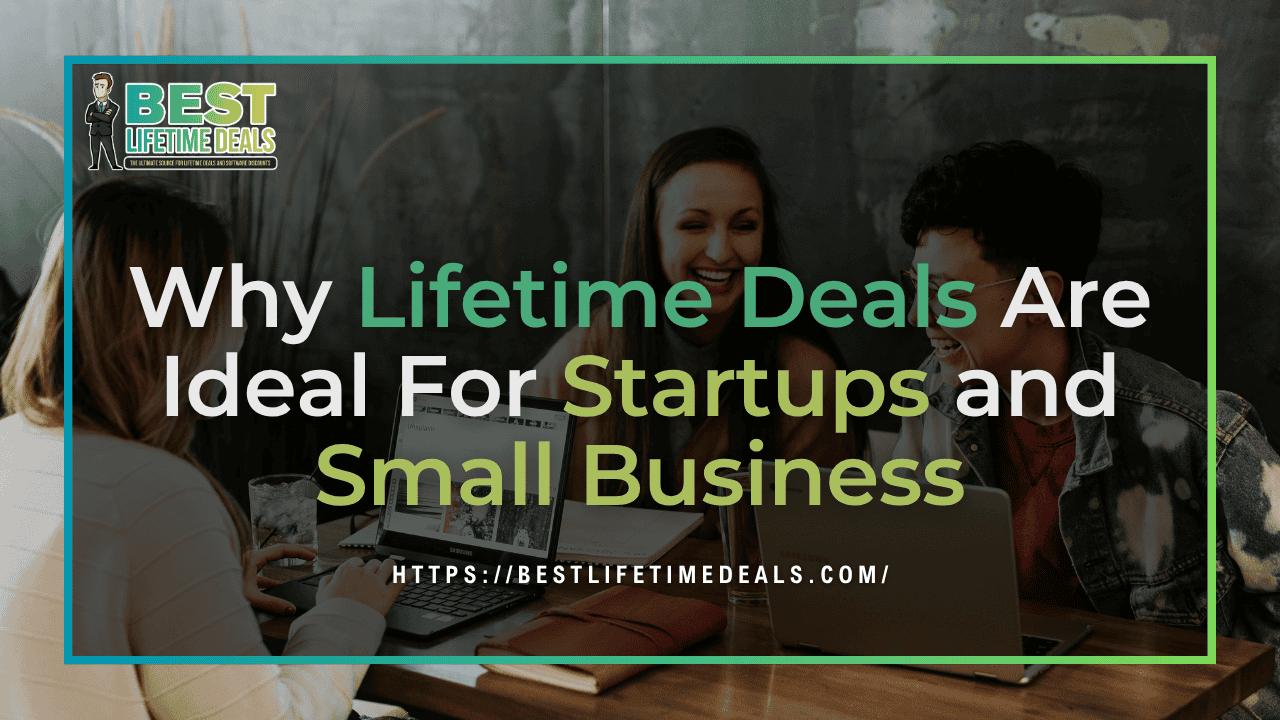
Why Lifetime Deals Are Ideal For Startups and Small Business
in AI Tools, Business, Business Checklists, Business Startups, Digital Marketing, Make Money OnlineUnlock Long-Term Value: Discover Why Lifetime Deals Are the Smartest Investment for Startups and Small Businesses

Lifetime deals can be a game-changer for startups and small businesses. They provide an opportunity to acquire customers, generate cash flow, and gain traction in the market. This article delves into the world of lifetime deals, explaining what they are, how they work, and why they are especially beneficial for businesses.
Understanding Lifetime Deals
What is a Lifetime Deal?
A lifetime deal is a pricing strategy where a customer pays a one-time fee for lifetime access to a product or service, instead of paying recurring subscription fees. This differs from regular subscription models, where users pay regularly (monthly or annually). The “lifetime” typically refers to the lifespan of the product or the company offering the deal. Many SaaS companies offer lifetime deals to attract early adopters and boost initial cash flow.
Benefits of Lifetime Deals for Startups
For startups, offering a lifetime deal can be a powerful way to generate an initial influx of cash. This upfront payment can be crucial for covering SaaS costs. In addition to funding, lifetime deals offer other key benefits:
- They can help build a user base quickly, providing invaluable feedback and social proof.
- Attracting early adopters who are enthusiastic about the product can lead to increased traction and positive word-of-mouth referrals.
How Lifetime Deals Work in SaaS
Lifetime deals have become increasingly popular in the SaaS (Software as a Service) industry, offering businesses and individuals a unique way to access premium software tools without recurring subscription fees. Understanding how lifetime deals in SaaS work can help you make informed decisions about which tools to invest in and how to maximize their long-term value.
1. One-Time Payment for Lifetime Access
The core concept of a lifetime deal is simple: instead of paying a monthly or annual subscription, you make a one-time payment and receive permanent access to the software. This allows users to enjoy all—or most—of the software’s features without worrying about ongoing costs, which can save significant money over time, especially for small businesses and freelancers.
2. Limited-Time Offers
Most SaaS providers offer lifetime deals as limited-time promotions to attract early adopters and generate cash flow. These deals often come with a discounted price compared to the software’s standard subscription model. Since these offers are temporary, users who act quickly can secure a lifetime subscription at a much lower cost than what future users would pay through traditional subscriptions.
3. Features Included in Lifetime Deals
Lifetime deals typically include full access to the software’s core features, though some may exclude advanced functionalities or add-ons available in higher subscription tiers. Providers often include updates and support as part of the lifetime deal, but the specifics can vary. It’s crucial to read the deal terms carefully to ensure that it meets your long-term needs.
4. Benefits for Users
The main advantage of SaaS lifetime deals is cost savings. Paying once for a lifetime subscription eliminates the need for recurring fees and offers predictable long-term budgeting. Additionally, lifetime access allows users to explore the software fully, integrate it into workflows, and benefit from updates without worrying about future price increases.
5. Benefits for SaaS Providers
Lifetime deals also benefit SaaS companies by generating upfront revenue, attracting early adopters, and increasing product visibility. For new SaaS startups, offering lifetime deals can help them build a user base, gain feedback, and refine the product before rolling out full subscription plans.
6. Things to Consider Before Purchasing
While lifetime deals can be highly advantageous, users should consider the following:
- Provider Stability: Ensure the company is reliable and will continue supporting the software long-term.
- Feature Limitations: Verify which features are included and if any premium add-ons require additional fees.
- Update Policies: Confirm whether lifetime updates are included or limited to a specific version.
- Usage Needs: Determine if you’ll use the software enough to justify a one-time investment.
7. How to Make the Most of Lifetime Deals
To maximize the value of SaaS lifetime deals, consider:
- Integrating the software fully into your workflow.
- Staying updated with new features and updates offered by the provider.
- Leveraging the software for multiple projects or team use if permitted by the license.
Lifetime deals in SaaS offer a cost-effective way to access premium software without recurring subscription fees. By paying once, users can enjoy long-term access, updates, and support while saving money and streamlining their workflow. However, careful evaluation of the provider, features, and terms is essential to ensure the deal is worthwhile. Lifetime deals are particularly beneficial for entrepreneurs, freelancers, and small business owners looking for reliable software at a predictable, one-time cost.

Advantages of Lifetime Membership
Cost-Effectiveness for Small Businesses
For small businesses and startups, the cost-effectiveness of a lifetime deal is a major draw. Instead of facing recurring costs associated with a subscription model, businesses can provide lifetime access for a one-time fee. This can be significantly cheaper for the customer in the long run, making it an attractive proposition. By carefully calculating the lifetime value (LTV) and setting an appropriate lifetime deal price, SaaS businesses can effectively acquire new users while ensuring profitability. Platforms like AppSumo often help facilitate these kinds of arrangements to connect SaaS companies with potential customers.
Long-Term Value of Digital Products
The long-term value offered by digital products through lifetime deals is substantial. Customers gain lifetime access to software or services, which is particularly advantageous for products they anticipate using for many years. This pricing strategy also helps SaaS founders consider the long-term engagement of users and how their product or service can provide ongoing value. A CRM or note-taking app offered with a lifetime license may increase its value to users as their data and usage grow over time, solidifying the lifetime membership’s worth.
Attracting Customers with Lifetime Offers
Offering a lifetime deal can be a powerful strategy to attract early adopters and build a loyal user base. The appeal of a lifetime offer, where customers pay a one-time fee for lifetime access, can be incredibly enticing, especially for those who are tired of regular subscription fees. SaaS companies may use this approach to generate a quick influx of cash flow and gain traction in a competitive market. By using platforms like AppSumo to offer lifetime deals, they can reach a broader audience of potential customers willing to pay for long-term value. Carefully considering usage limits and SaaS costs, however, is important.
Implementing Lifetime Deals in SaaS Businesses
Strategies for Offering Lifetime Deals
When implementing a lifetime deal strategy, SaaS businesses need to carefully consider the parameters of the lifetime offer. One approach is to offer a lifetime subscription as a premium option alongside regular subscription plans. Another strategy is to offer lifetime deals to attract early adopters during the initial launch phase to generate an upfront influx of cash flow and build a substantial user base. The lifetime deal price should be set based on the estimated lifetime value (LTV) of a customer, ensuring that SaaS costs are covered and profitability is maintained. Usage limits and restrictions may also be imposed to manage server resources.
SEO Considerations for Lifetime Deals
SEO plays a crucial role in the success of lifetime deals. SaaS companies should optimize their websites and landing pages to target keywords related to “lifetime deal,” “lifetime access,” and “one-time payment.” Creating content that highlights the long-term value and cost-effectiveness of a lifetime offer can attract customers actively searching for alternatives to regular subscription models. Platforms like AppSumo provide a built-in audience interested in lifetime offers, and optimizing listings on such platforms can further boost visibility. Proper SEO ensures that potential customers find your lifetime deal when searching for SaaS products.
Measuring Success of Lifetime Offers
Measuring the success of lifetime offers involves tracking several key metrics. The initial influx of cash flow generated is an immediate indicator, but it’s equally important to monitor long-term user engagement and retention. Analyze how lifetime users interact with your SaaS product compared to subscription customers. Tracking the number of customers acquired, the lifetime value (LTV) realized, and the cost of supporting lifetime users is critical for assessing the profitability and sustainability of the lifetime deal strategy. Adjusting the lifetime deal price and usage limits based on these metrics is important for SaaS businesses.

Considerations for Startups
Risks of Offering Lifetime Membership
Offering lifetime membership comes with inherent risks for startups. There are several concerns that SaaS founders need to consider:
- The potential strain on resources if the user base grows rapidly, leading to increased SaaS costs and potential server overload.
- Underestimating the lifetime value (LTV) and setting the lifetime deal price too low, which can negatively impact long-term profitability.
Understanding these risks allows startups to treat lifetime deals with caution, carefully considering the long-term implications of supporting lifetime users, especially if the product or service requires ongoing maintenance and updates
When to Offer Lifetime Deals
The timing of offering a lifetime deal is crucial for startups. It’s often most effective at specific points in a company’s lifecycle, such as:
- During the initial product launch phase to generate buzz and attract early adopters.
- When a startup needs a quick infusion of cash flow to fund development or marketing efforts.
Startups should also consider offering lifetime deals to clear out excess inventory or attract new users to a less popular product or service. Understanding when a lifetime offer aligns with the business goals can maximize its impact and minimize potential risks. Avoid offering lifetime subscriptions when future costs cannot be reliably predicted.
Balancing Value and Profitability
Balancing value and profitability is essential when designing lifetime deals for SaaS businesses. Startups must set a lifetime deal price that is attractive to customers while still covering SaaS costs and ensuring long-term profitability. Carefully assessing the lifetime value (LTV) and incorporating usage limits or restrictions can help maintain this balance. It’s also important to consider how the lifetime offer impacts the perceived value of the product or service. By striking the right balance, startups can use lifetime deals to attract new users, generate cash flow, and build a sustainable business model without compromising profitability. Consider lifetime deals may or may not affect your brand depending on how you approach it.

Frequently Asked Questions
What are the benefits of a lifetime deal for startups?
A lifetime deal offers startups a way to secure a software or service for a one-time fee, providing long-term value without the burden of recurring revenue. This can significantly improve cash flow, as businesses no longer have to worry about monthly subscriptions. Additionally, it allows startups to allocate resources more effectively, focusing on growth and development rather than ongoing costs.
How can a lifetime membership impact my startup’s customer acquisition costs?
Lifetime memberships can reduce customer acquisition costs by attracting users with a compelling offer. When a business provides a highly shareable product at a lifetime pricing model, it encourages word-of-mouth marketing and referrals, lowering the overall expense of gaining new customers. This strategy is particularly effective for small businesses looking to expand their user base without extensive paid promotion.
Why are lifetime software deals popular among business owners?
Business owners often prefer lifetime software deals because they provide a cash flow boost and eliminate the uncertainty of annual recurring revenue. These deals ensure that businesses have access to necessary tools that solve real problems for the lifetime of the business, making them an attractive option for startups and established companies alike.
How do deal platforms like AppSumo benefit startups?
Deal platforms such as AppSumo offer startups exposure to a large audience, allowing them to reach potential customers who may not have been aware of their product. By listing their services on platforms that specialize in lifetime deals, startups can generate an influx of users and create a viral loop built-in to their marketing strategy, leading to increased visibility and sales.
What is the impact of customer support on lifetime deals?
Customer support plays a crucial role in the success of lifetime deals. Startups that offer excellent customer support can provide valuable feedback to their users, enhancing the product and fostering loyalty. This positive relationship can lead to repeated business and referrals, ultimately benefiting the startup’s growth trajectory.
Can a popular note-taking app offered as a lifetime deal attract more users?
Yes, a popular note-taking app offered as a lifetime deal can significantly attract more users. By providing a service for a one-time fee, the app can appeal to small businesses looking for cost-effective solutions. This model can also create a sense of urgency, encouraging potential users to take action before the deal expires.
What are some risk mitigation strategies for startups considering lifetime deals?
Startups should carefully evaluate their pricing strategy and market demand when offering lifetime deals. Risk mitigation strategies include setting limits on the number of lifetime memberships available, ensuring that the business can sustain itself without relying solely on these sales. Additionally, providing a strong product roadmap and customer support can help maintain customer satisfaction and loyalty.
How can a lifetime deal contribute to a startup’s long-term success?
A lifetime deal can contribute to a startup’s long-term success by establishing a dedicated user base that is invested in the product. This can lead to recurring revenue through upsells and cross-sells, as satisfied customers are more likely to purchase additional services. Moreover, a well-structured lifetime deal can create a loyal community that provides ongoing feedback, helping the business to improve and adapt over time.
What is a lifetime deal and how does it benefit startups?
A lifetime deal is a one-time payment for a software service that provides lifetime access to the product. For startups, this model can significantly reduce customer acquisition costs and provide a cash flow boost, allowing them to allocate resources towards growth and other essential areas of their business.
